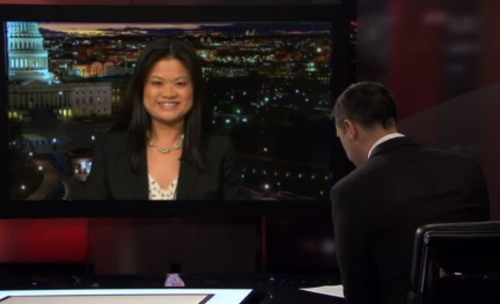Ying Ma's Blog, page 15
May 9, 2017
Foreign Policy Interventionists in the Trump Era
Washington Examiner, May 8, 2017
Haters of President Trump are not known for their capacity for self-criticism. Having waged all-out, nasty battles to defeat him last November, they have decided to blame anyone but themselves for their failure. Democratic presidential nominee Hillary Clinton blames Russian hacking and FBI Director James Comey for her electoral loss. The mainstream media, which largely dispensed with any pretense of objectivity in the last election, blames the Trump administration for its hostility toward them.
Other Trump opponents, including right-wing foreign policy professionals who declared Trump unfit for office, are now busy evaluating whether Trump is “normalizing,” or becoming more like them.
To read the entire article, please click HERE .


April 27, 2017
How You Should Decipher Trump’s Foreign Policy
Washington Examiner, April 27, 2017
–Commentary by Ying Ma
Talking heads on television and so-called experts in the Washington policy community concluded long ago that President Trump has no cogent foreign policy and merely changes his mind from one moment to the next.
In recent days, they have pointed to early steps by the Trump administration, on China, Syria and NATO, as proof that Trump is infinitely malleable on policy matters.
While Trump arrived in office with relatively few policy details and is far less ideologically-dogmatic than his predecessors, he did outline on the campaign trail guiding principles for his approach to dealing with the world. For those who were paying attention to what he said rather than sneering at his candidacy, his evolving policy positions are not all that surprising.
To read the entire article, please click HERE.


April 5, 2017
Republicans Need to Rally around Trump
The National Interest, April 4, 2017
During the 2016 campaign, numerous prominent conservatives opposed the Trump candidacy and warned that its success would be inexorably bad for conservatism.
Some two months into his presidency, rifts between Donald Trump and conservatives are in plain sight. The new president has blamed the recent failure to repeal and replace Obamacare on the conservative House Freedom Caucus. In various presidential tweets, he named and blamed various caucus members and even threatened to fight against the group along with Democrats in the midterm elections of 2018.
Were Trump’s conservative critics correct all along that he is bad for their cause?
While the failure to repeal Obamacare is no doubt a setback for the Trump administration and Republicans in general, conservatives should nevertheless be heartened by the overall progress made and broad direction set by the new president. Unconventional though his presidency may be—and it certainly is, beyond the wildest imagination—Trump has pursued an agenda that is friendly to many of conservatism’s cherished ideals.
Since his inauguration, President Trump has picked a cabinet that many acknowledge is the most conservative in history and nominated Neil Gorsuch, a highly respected conservative judge, to the Supreme Court. Furthermore, he has pursued regulatory reform, border and homeland security and pro-market measures that conservatives have long supported.
Click here to read the rest of the article.


January 18, 2017
7 Tips for Effective Communications
Clare Boothe Luce Policy Institute, January 18, 2017
–by Ying Ma
I often encounter young women who tell me they wish to pursue a career in communications. It is a perfectly worthy goal. Communicating well is a useful skill to have in any profession, and being a communications professional can be richly rewarding. With that said, communications skills do not just materialize out of thin air. Much like playing a sport or a musical instrumental, communicating effectively and professionally takes practice. Some people have a natural talent for it; many do not. No matter which group you belong to, you can become a better communicator by putting in the requisite time and effort.
I have worked as a communications professional in the private sector and in national politics. My clients have included multinationals and political campaigns. Here are seven tips I would offer to young people who wish to pursue a career in communications.
1. READ WIDELY
Anyone who wishes to communicate effectively must first READ. Reading helps you gain knowledge, and knowledge helps you think and analyze more cogently.
You should read at least one national newspaper a day. Examples are the New York Times, the Wall Street Journal, the Los Angeles Times, and the Washington Post.
These papers are far from infallible, but their articles are generally better written, better edited, and better researched than those published by smaller competitors. Additionally, these major newspapers provide more than just news of the day—they provide context.
In our modern era, many of us obtain news highlights from multiple sources, including 24-hour cable news and social media. Much of it is helpful, but plenty is not. Headlines and 140 characters are just white noise if you do not know how they relate to other stories or why the content even matters. Reading—or at least skimming—a major newspaper every day helps facilitate a broader understanding of the issues, how they are connected to each other, and how they might affect your work.
Ideally, communications professionals should read constantly and widely, and should consume everything from books to journals, blogs to industry-specific newsletters. The more we read, the more we know; the more we know, the more successfully we can talk, write, and otherwise advocate on behalf of our clients.
2. BECOME A BETTER WRITER
Writing is a big part of communications. Unfortunately, sloppy writing is a regular feature of the communications industry. Often, sloppy writing results from sloppy thinking. Reading widely and being regularly exposed to well-argued ideas (as discussed above) will reduce sloppy thinking, while taking other practical steps can help reduce sloppy writing. For example, you can do the following: 1) take a writing class, 2) consult guidebooks about how to become a better writer, and 3) write and rewrite.
In a writing class, you will need to put pen to paper and receive constructive criticism from your instructor and potentially your peers. This is a great way to discover what you are doing right or wrong, and what you can do better.
Consulting guidebooks will allow you to take advantage of advice from expert writers and editors. A classic guide is The Elements of Style, an elegant book widely considered to be the definitive text on the English language. Among other things, it teaches how to write with brevity and clarity, and how to avoid common mistakes.
Of course, the only way to really improve your writing is to put the tools and advice to use. All writing is rewriting, and the more you practice, the better you will get. In your spare time, write an essay, a letter, an opinion article, or whatever else that might interest you. In due time, you will get better.
3. LEARN TO EDIT
There is a lot of overlap between writing and editing, but the two are not the same. Writing requires some amount of creativity and perhaps even specialized knowledge. It is about drawing the big picture and filling it with the relevant details. Editing is about technique, and is aimed at fine-tuning the writing that is already in place.
Learning to edit is not that different from learning to write: you will need to make use of available tools and practice. Take an editing class, learn via online tutorials, or learn from friends or colleagues.
Make sure you also use a style guide. There are a lot of technicalities in the English language that we do not think about every day. A style guide will help answer questions about grammar, usage, spelling, punctuation, capitalization, abbreviation, and all other crucial areas of writing.
Two style guides to consider are the Chicago Manual of Style and the Associated Press Stylebook. The former is the bible that governs the rules of publication, while the latter is the gold standard for news writing. If you are likely to work with books, short stories, reports, policy memos, and white papers, choose the former. If you are likely to work regularly with journalists, choose the latter. Regardless of which style guide you use, stick to it and be consistent.
However you do your editing, do not be afraid to solicit editing help for your writing. Even the best writers need an editor, whether for correcting simple mistakes on grammar or mechanics, or for reshaping the substance of the written product.
Ultimately, all ideas are better communicated when they are professionally presented. Bad writing and bad editing will undermine the message you are trying to convey. Try to avoid both.
4. CHECK YOUR FACTS
Do not play fast and loose with the facts. Make sure that whatever information you release to the public is accurate. Before publication, do a Google search, double check with those who have the relevant knowledge, cross-reference with existing published materials, or seek fact-checking assistance from colleagues.
If bad writing and bad editing can undermine the written product, factual errors could fundamentally damage the integrity and effectiveness of the underlying message. Make a habit of preventing such errors from occurring.
5. EDUCATE YOURSELF ABOUT YOUR CLIENT’S BUSINESS
Communications professionals are often called upon to speak on their clients’ behalf. Hence, it behooves them to learn about their clients’ businesses. If your client is a political candidate, study his policy positions and public statements. If you are working for a company or an organization, learn about its mission, its business model, and its comparative advantage. (For those who work in-house, their client obviously would be the employer.)
Many years ago, I became the public relations manager for a Nasdaq-listed company in Silicon Valley. I attended a get-to-know-you meeting with our company’s public relations firm and quickly realized that the firm knew precious little about my company’s business. It was deeply offensive, and the firm’s work product on our behalf reflected this lack of knowledge and disinterest. Naturally, our company did not remain a client of that firm for long.
When you are working for a client, gather as much information as possible about it. Often, your client will be the best source of nonpublic information. Don’t be hesitant to ask questions and don’t be afraid to learn new things.
6. DO NOT SUBSTITUTE YOUR OPINIONS FOR YOUR CLIENT’S
A lot of young people show up at the workplace with great ambitions and big ideas. It is one thing, however, to offer ideas to the client, but quite another to think that your ideas should replace the client’s.
If you work for a national political candidate, he is likely to have policy positions on issues ranging from taxes to healthcare to foreign policy to cyber security. You may think you know more than he does because you took a class or wrote a research paper. On certain narrow issues, you might be right, but that does not matter. Your job is to help him formulate and communicate his ideas, not to substitute your ideas for his.
As such, do not get upset if he is not interested in your senior thesis, or if he does not adopt your proposals. He is the candidate; you are not. If you are a junior staffer, do not assume you should be representing your candidate on national television. You do not yet have what it takes.
This is not to say that communications professionals have no right to be frustrated when their client does not heed their advice. What you should always keep in mind, however, is that your client is paying you, not vice versa. Ultimately, it is the client’s positions and interests you must serve.
7. NEVER STOP LEARNING
Even seasoned communications professionals need to constantly refresh their skills. New technologies emerge and new developments occur all the time in business, politics, and beyond.
For example, social media platforms such as Facebook and Twitter have emerged as essential tools for professional communications, but ten years ago, the term “social media” was not even part of our popular consciousness. For communications professionals who did not grow up in the social media age, we had to familiarize ourselves with the new medium and hire new team members who could wield it more proficiently.
Other unforeseen technologies and platforms will no doubt continue to emerge. Remain curious and don’t stop learning, and you will be well positioned to face new challenges and capitalize on new opportunities.
CONCLUSION
Communicating effectively and professionally is not rocket science, but it does require time and effort. Unfortunately, communications professionals have a tendency to be glib. Many do not write well or speak clearly; others do not know how to think critically; many more think communications is easy and do not take the need for self-improvement seriously.
Do not follow in their footsteps. The advice here will not guarantee success, but it will set you on a path of competence and self-respect, and it will get you started on communicating more effectively.
About the Author: Ms. Ma is a member of the Board of Advisors for the Clare Boothe Luce Policy Institute and served as the deputy communications director for the Ben Carson for President 2016 Campaign and the deputy director of the Committee for American Sovereignty, a pro-Trump super PAC. Previously, she managed corporate communications for Sina.com, a Nasdaq-listed company, and worked on public affairs for Burson-Marsteller, one of the world’s largest public relations firms.


December 1, 2016
Media Bias at CNN and the New York Times
The National Interest, December 1, 2016
The mainstream media suffered a further erosion of its authority during the 2016 campaign. It copiously displayed its disdain of Donald Trump, not least in assuming that his election to the presidency was not simply unlikely, but next to impossible. Then came the evening of November 8, when assorted media pooh-bahs stared in incredulity at the actual results—a Republican trifecta.
Many have blamed Trump himself for his adversarial relationship with the press, but that distracts from the media’s culpability. However unconventional or controversial Trump’s candidacy was—and it certainly broke new ground—the mainstream media have long failed to report the news truthfully about right-of-center public figures with whom it disagrees.
In my view, at a time when many are complaining about “fake news” manufactured by Russia, it is worth taking a closer look at the mainstream media’s complacency and downright dishonesty. Numerous examples exist, but two incidents involving Dr. Ben Carson, surely the most civil and genteel GOP presidential contender in the 2016 election, are illuminating.
Click HERE to read the entire article.


November 11, 2016
Ying Ma Talks to ABC (Australia) About Trump Victory
Lateline, ABC (Australia), November 11, 2016
Ying Ma appeared on Lateline, Australia’s leading daily current affairs program, to discuss the Donald Trump victory and his agenda moving forward. To view the discussion, please click HERE. Lateline airs weeknights on ABC in Australia.



November 8, 2016
“Trump Calls Me American”: Average Citizens Find Their Voice Through Donald Trump
 A Wegman’s truck. A Friendly’s restaurant. Fall foliage in bright sunlight. A crisp chill in the air.
A Wegman’s truck. A Friendly’s restaurant. Fall foliage in bright sunlight. A crisp chill in the air.
It’s late autumn in Hershey, Pennsylvania.
On the last Friday before Election Day, Donald Trump came to town for one of his massive rallies.
The mainstream media and the political establishment have relentlessly slandered these rallies as a congregation of the great unwashed—dumb and uneducated white people; racists, sexists, and xenophobes.
Yet, tens of thousands continue to show up at each event. When the Trump supporters begin cheering for their candidate, it is explosive and emotional—and deeply touching.
For Trump, the connection with his most ardent supporters is genuine, instinctive, and seemingly unbreakable. In Iowa over the weekend, he spoke glowingly of himself, as he always does, but also of the historic political movement he leads:
There has never been anything like this in our country. I say it all the time. [Fox News anchor] Bill O’Reilly said…. in his lifetime, this is the single greatest political phenomenon that he’s ever seen. It’s huge. I’m the messenger. I’m the messenger. It’s you. It really is—I’m a good messenger, you have to say, right? But it is you.
Eight years ago, when then-Senator Barack Obama made his historic bid for the White House, he displayed a different mindset. His supporters referred to him as “The One,” and his wife informed the country that, when her husband became the presidential nominee of the Democratic Party, was the first time that she was proud of her country.
That is not the Trump narrative, and no one knows that better than Trump’s supporters. In Hershey, they were out in full force. They packed into the halls of the Giant Center, a 10,500-seat arena. Many had lined up well over four hours before official starting time. Some 7,000 people couldn’t even get in.

The atmosphere in line and inside the arena was jovial and festive, much like a rock concert without the drugs. One supporter’s T-shirt summed up the sentiments of other rally goers: “Obama calls me bitter clinger. Clinton calls me deplorable. Terrorists call me infidel. Trump calls me American.”
Before Trump arrived, his rally attendees repeatedly booed Hillary Clinton and chanted “Lock her up!” when her face appeared on the Jumbotron. They appeared to enjoy even more, chanting “CNN sucks!” each time the on-site CNN reporter went on the air.
A young woman and her mother, attending their second Trump rally, noted the friendliness and warmth of everyone they’d met.
A young couple from Baltimore (he’s white, she’s black) said they had watched every one of Trump’s rallies online.
Elderly veterans, some who could barely get in and out of their seats without assistance, proudly waved “Veterans for Trump” signs.
A lady with a ready smile and a mild Southern accent had driven up alone from Gettysburg. She thinks Hillary Clinton is a congenital liar and believes the Justice Department, having been politicized under the Obama administration, should not be a de facto part of the executive branch.
When Trump finally strolled onto the stage to the tune of Lee Greenwood’s God Bless the USA, the arena went wild with cheers and applause: The love fest had officially began.
Trump talked about the issues that have become familiar in this year’s campaign: better trade deals, building a wall, creating opportunities for black Americans trapped in inner cities, defeating ISIS, honoring America’s veterans, and winning.
It was clear to those in attendance that this egomaniac who loves to talk about himself, whose bombast and bravado is rarely muted, is humbled by the faith they have placed in him. They know he is deeply flawed, but they do not care, not just because he speaks for them, but also because they do not doubt that he loved America before he began running for office. As their messenger, he is the one who must deserve them.
By the time Trump exited to the sound of the Rolling Stones’ You Can’t Always Get What You Want, it was easy to believe that if given a chance to try, he might just get Americans what they need.
Supreme Court Justice Clarence Thomas, someone far removed from the campaign trail, might understand the Trump phenomenon better than much of the political chattering class. At a recent address at the Heritage Foundation, he discussed his love of visiting small towns across the country in his own 40-foot coach, and sounded like he was speaking of a Trump rally. He remarked:
This, first of all, is a wonderful country, and we fly over most of it. You see the citizens of this country. An RV park is very, very democratic, with a small “d.” It is some of everybody there…I love it all…everything about it, I love it. This is a great country; [my wife and I have] done about 40 states…. It shows you the constituency for the Constitution. It shows you it’s not [Washington], it’s not all the people who are doing all the talking and the prevaricating. It’s just a person who’s camping out of the back of his motorcycle, who wants to be left alone, who wants to enjoy his country, who wants to raise his family or her family, and they’re just friendly.
Trump—instinctively—knows that the constituency for the White House, much like the constituency for the Constitution, is not Washington or those who do the talking and the prevaricating.
They are the people who pack into his rallies in Hershey and all across the country, and they are just friendly, and they just want to enjoy their country.
Their messages are by no means pitch perfect, and for that they have been roundly condemned, ridiculed, and deemed beyond the pale. But the Trump movement has offered a potent reminder that average Americans should not have to speak in the same way as snotty Ivy Leaguers, establishment politicians, or the mainstream media in order to have their concerns and wishes taken seriously.
In this chaotic election, millions of Americans who have no access to wealth or a fancy education have found their voice, even if it is less than pitch perfect. Whether Trump wins or loses, giving a voice to so many of his fellow citizens may be the biggest achievement of his political revolution.


October 24, 2016
Ying Ma Speaks at Reagan Ranch Center
YAF, October 20, 2016
Ying Ma addressed the Young America’s Foundation’s Fall High School Conference last week at the Reagan Ranch Center in Santa Barbara, California. To view the speech, please click HERE.


October 16, 2016
Ying Ma Defends Trump on Fox News
Fox News, October 14, 2016
Ying Ma appeared on The Kelly File on Fox News to discuss sexual assault allegations against Donald Trump and her reasons for supporting the presidential candidate. Click HERE to watch the interview.



October 12, 2016
Proud to Be a Trump “Deplorable”
Fox News, October 12, 2016
–Commentary by Ying Ma
I’m a woman, a racial minority, and an immigrant, and I grew up in inner-city America. I have two university degrees, one from Cornell University and another from Stanford Law School. I have worked for some of the most elite institutions in America, including a foreign policy organization that counts Chelsea and Bill Clinton among its members.
According to conventional wisdom, I have no business being a Trump supporter. Yet I have been an unabashed fan since Trump declared his candidacy for president. In fact, never in my life have I been this excited about a presidential nominee.
Click HERE to read the entire article.





